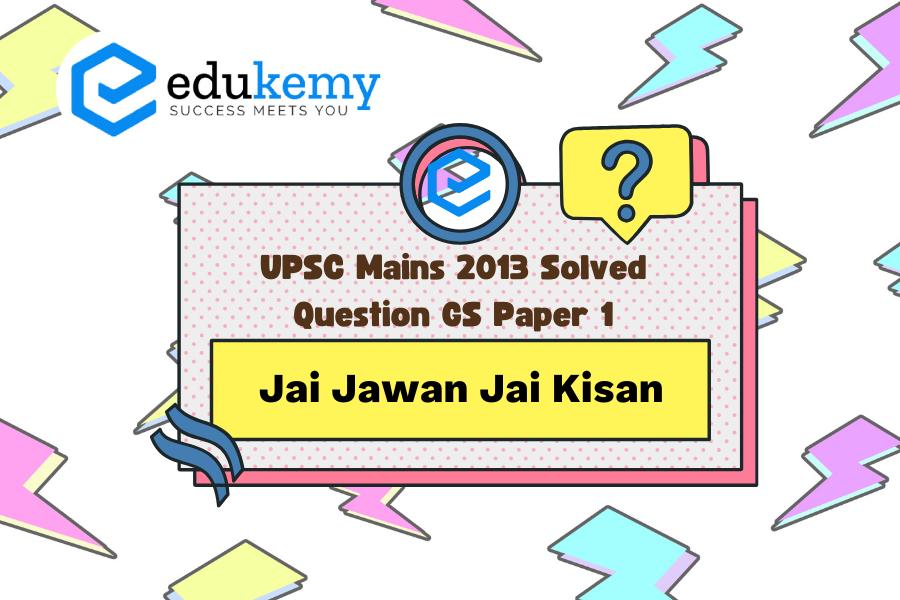The slogan “Jai Jawan Jai Kisan” (Hail the Soldier, Hail the Farmer) holds profound historical significance in India, encapsulating the dual ethos of national defense and agricultural prosperity. Coined by former Prime Minister Lal Bahadur Shastri in 1965 during the Indo-Pak war, it emerged as a rallying cry to bolster morale on two critical fronts: the valor of soldiers defending the nation’s borders and the toil of farmers sustaining its populace. Initially conceived to inspire during times of conflict, the slogan evolved into a timeless emblem of national unity, resilience, and self-reliance. In its evolution, it has transcended mere rhetoric to symbolize the interconnectedness of security and sustenance in the nation’s fabric.
The slogan’s enduring significance lies in its ability to resonate across generations, serving as a constant reminder of the sacrifices made by both soldiers and farmers. It symbolizes the nation’s indebtedness to those who safeguard its borders and feed its people, underscoring the essential roles they play in shaping India’s destiny. Moreover, it highlights the imperative of ensuring the welfare and empowerment of these vital segments of society, reflecting a commitment to honor their contributions and address their needs. Thus, “Jai Jawan Jai Kisan” stands not only as a historical artifact but also as a guiding principle for national progress and solidarity.
Tags: Post-independence consolidation and reorganization within the country.
Contents
Decoding the Question:
- In Introduction, start with who gave the slogan and its meaning.
- In Body, discuss the backdrop and significance of Jai Jawan and Jai Kishan.
- Conclude with a demonstration, how the slogans have evolved with time.
Answer:
The slogan ‘Jai Jawan Jai Kishan’ was given by Prime Minister Lal Bahadur Shastri in the mid-1960s, at a time when India was battling dual threats of hunger and war. The slogans identify with our agriculture sector and national defense.
Evolution of Jai Jawan:
- In the 1960s, India was facing military aggression from both China and Pakistan.
- The Indo-China war took place in 1962 and Indo-Pak war took place in 1965. India was surrounded by hostile neighbors.
- Even the cold war politics was complicating the situation as Pakistan was an ally of the USA. So, India needed a strong army to secure her from foreign aggression.
To boost up the morale of our soldiers and to make it stronger, our Prime Minister Lal Bahadur Shastri gave the slogan Jai Jawan.
Evolution of Jai Kisan:
- In the 1960s, India was facing a serious economic crisis.
- India experienced twin draughts. Our economy was mostly dependent on agriculture and in agriculture, we were not self-sufficient.
- We were largely dependent on import of food grains. We had to import PL 480 from the USA.
- The Green Revolution had not come in yet. So, under the circumstances, to strengthen the hand of the farmers and boost agricultural production the slogan ‘Jai Kisan’ was given by prime Minister Lal Bahadur Shastri.
Significance of ‘Jai Jawan Jai Kisan’:
- The Green Revolution was initiated during the trying times, and it helped India in achieving self-sufficiency in the agricultural sector.
- The Indian Army’s morale was restored and the results of the 1965 and the 1971 war, against our arch-rival Pakistan, are a testimony to it.
- As a result of which, India emerged as a global power in the sub-continent.
The slogans have evolved over the years. Our ex-Prime Minister Atal Bihari Vajpayee added the slogan ‘Jai Vigyan’ to ‘Jai Jawan Jai Kisan’, which underlines the importance of science and technology, along with agriculture and security, to make the country prosperous.
In case you still have your doubts, contact us on 9811333901.
For UPSC Prelims Resources, Click here
For Daily Updates and Study Material:
Join our Telegram Channel – Edukemy for IAS
- 1. Learn through Videos – here
- 2. Be Exam Ready by Practicing Daily MCQs – here
- 3. Daily Newsletter – Get all your Current Affairs Covered – here
- 4. Mains Answer Writing Practice – here


